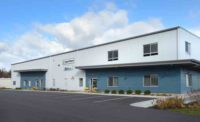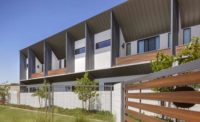Goal of Best-in-State Gymnasium Achieved with Metal-Clad Exterior

All photos courtesy of alanblakely.com



High school construction and renovation projects in rapidly expanding communities often are undertaken with a strong sense of civic pride, to emphasize a city’s new importance. This was the motivation leaders with the Agua Fria Union School District in Goodyear, Ariz., had when they described their goals for a new gymnasium, built in tandem with a significant renovation, for the 1,965-student Millennium High School. Their stated goal was to make the facility the most sought-after in the state, a goal they just might have achieved. The structure’s forward-looking design begins with its exterior, where metal wall panels are arranged in a complex pattern that helps break up the mass of the 45,000-sq.-ft. structure and sets it apart from the typical high school gym.
To say the Phoenix suburb of Goodyear has had a growth spurt in the past decade or so is an understatement – its population expanded by 46% between the 2010 and 2020 censuses, up to more than 95,000 in 2020, from just more than 65,000 ten years earlier. Of course, with all those new residents comes a need for new and expanded schools, which drove the Millennium High School renovation. The new multi-purpose facility, dubbed the Rise and Roar Center (the school’s mascot is a tiger), is the centerpiece of the effort. With seating for approximately 2,400, the center features three regulation basketball courts, tunnels to both locker rooms, a new weight room, boys and girls team rooms and a Diamond Vision display.
“Standing over 40 ft. tall at its highest point, the highest volume – the courts – features a sloped roof reflective of the surrounding desert mountains,” says Christina Noble, AIA, senior project designer with the Phoenix office of BWS Architects, which designed the gymnasium, describing its impressive interior. “Deep overhangs protect clerestory glazing that bring mountain views to the building interior.”
For the exterior façades, designers wanted to use metal wall panels to create the abstracted representation of tiger stripes, topped by the school teams’ signature purple to emphasize the building’s interior volume. Clever planning helped minimize the seeming intricacy of translating the striped patterning to the installers, according to Jesse Ross, AIA, BWS’s project architect on the job.
“While our pattern appears complex, we were able to keep to a standard panel size and connections, leading to few-to-no custom details,” he says, adding that he’s pleased with the finished appearance. “There’s always the fear that what you put on paper may not translate into reality, but the pattern turned out just as we had hoped.”
The striping design isn’t as random as it looks, which also aided installation, according to Mike Villa, project manager with Phoenix-based installer Progressive Roofing. “We laid it out like an individual puzzle section – we created a pattern in a 20-by-20 module,” he says. “It becomes really hard to see that it really is a pattern.”
The work has paid off in community appreciation for the new facility, which has hosted several national tournaments since its completion in February 2022. And those who worked on the job have their own sense of pride from a job well done.
“I’m really pleased with the outcome,” Villa says. “There’s been a lot of good talk about how we were able to get the blending of the joints. Overall, this turned out better than a log of other projects that aren’t as complicated.”
Looking for a reprint of this article?
From high-res PDFs to custom plaques, order your copy today!







